Introduction
Large Language Models (LLMs) are advanced artificial intelligence systems trained on vast amounts of text data to understand and generate human-like language.
These models have revolutionized natural language processing, offering LLM for businesses capabilities far beyond traditional NLP services.
Recent statistics show that the LLM market is expected to grow from $1.1 billion in 2023 to $35.2 billion by 2030 (Source: Grand View Research, 2023).
LLMs vs traditional NLP services highlight significant improvements in accuracy and versatility.
While exploring LLM alternative solutions, researchers have discovered applications beyond text generation, such as code writing and creative content creation. Alternative LLM applications include virtual assistants, content summarization, and sentiment analysis.
Despite challenges, LLM as a service continues to evolve, promising transformative impacts across various sectors.
What are Large Language Models (LLMs)?
It's like a way of teaching machines to learn patterns and ideas by feeding them huge amounts of data.
For LLMs, deep learning is the brainpower that makes them so smart, allowing them to grasp the complexities of language.
Given below are the capabilities of LLM:
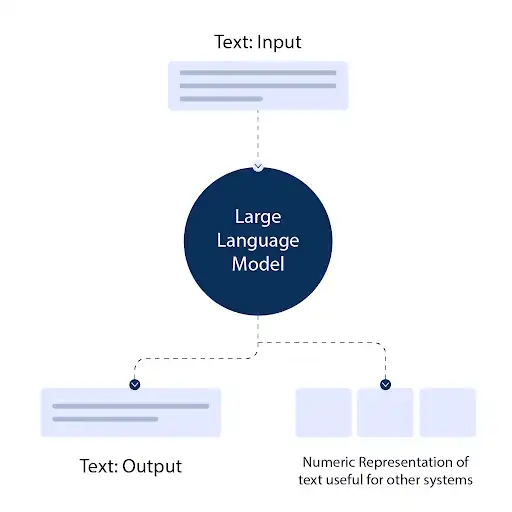
Large Datasets: Fueling LLM Performance
The more ingredients (or data) they have, the better the meal (or outcomes) they can prepare.
Quality and variety matter too. LLM as a service need loads of high-quality and diverse data to truly understand language and produce accurate responses.
Text Generation & Content Creation
LLM as a service is like having a versatile writer at your fingertips.
They can write stories, generate reports, or even come up with creative content on the fly. This makes them incredibly useful for tasks that need a human touch.
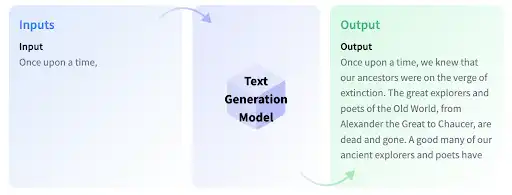
Language Translation & Summarization
Consider LLMs as the ultimate polyglots and summarizers. They can effortlessly translate between languages, making communication across cultures easier.
Plus, they can condense long documents into short summaries, saving you hours of reading time.
Code Generation & Analysis
Picture a coder who never sleeps. LLMs can understand programming languages, helping developers by writing code snippets and analyzing code for errors.
It's like having an extra pair of eyes that's fluent in coding.
And More!
This is just scratching the surface. LLM as a service has a vast potential that spans beyond what we've covered.
From answering questions to helping with research, they're shaping up to be invaluable tools across different fields.
LLM As a Service
Offering Large Language Model (LLM) as a service has opened up a new frontier for digital solutions.
This service is especially beneficial for LLM for businesses, offering a turnkey solution to leverage advanced AI without the heavy lifting.
LLM as a Service (LLMaaS) refers to the provision of Large Language Models through cloud-based platforms, making these powerful AI tools accessible to businesses and developers without the need for extensive infrastructure or expertise.

In simple terms, it's like renting a super-smart AI brain that understands and generates human-like text. Instead of building and maintaining your own complex AI system, you can access one through the internet, just like you might use other online services.
These AI models can perform a wide range of tasks, such as:
Writing content
Answering questions
Summarizing text
Translating languages
Coding assistance
LLMaaS providers handle the technical complexities, including model training, updates, and scaling. Users typically interact with the AI through simple APIs, allowing them to integrate these capabilities into their own applications or workflows easily.
This service model makes advanced AI accessible to companies of all sizes, not just tech giants. It opens up possibilities for enhancing customer service, content creation, data analysis, and more, without requiring a huge investment in AI infrastructure or expertise.
However, users should be aware of potential limitations, such as data privacy concerns and the need to fine-tune outputs for specific use cases. Despite these challenges, LLMaaS is rapidly becoming a powerful tool for businesses looking to leverage AI capabilities.
LLM Alternative Solutions and Alternative LLM Applications
Here's an overview of LLM alternative solutions and alternative LLM applications, with examples:
LLM Alternative Solutions
The LLM solutions are the following:
Rule-based systems: These use predefined rules for specific tasks. Example: A customer service chatbot with preset responses for common queries.
Traditional machine learning models: Simpler models for specific tasks. Example: Spam filters using Naive Bayes classifiers.
Expert systems: Programs that mimic human expert decision-making. Example: Medical diagnosis systems like MYCIN.
Knowledge graphs: Structured databases representing relationships between entities. Example: Google's Knowledge Graph for enhancing search results.
Alternative LLM Applications
The alternative LLM applications are the following:
Code generation: LLMs can write and debug code. Example: GitHub Copilot assists developers by suggesting code snippets.
Text summarization: Condensing long documents into brief summaries. Example: TLDR This, which creates summaries of articles or long texts.
Language translation: Real-time translation between multiple languages. Example: DeepL Translator, which uses neural networks for high-quality translations.
Content creation: Generating marketing copy, articles, or creative writing. Example: Jasper.ai for creating blog posts, social media content, and ads.
Sentiment analysis: Analyzing text to determine emotional tone. Example: Brandwatch for social media monitoring and brand sentiment analysis.
Personalized education: Tailoring learning materials to individual students. Example: Carnegie Learning's MATHia platform, which adapts to each student's pace and learning style.
Legal document analysis: Reviewing contracts and legal texts. Example: ROSS Intelligence for legal research and document analysis.
Healthcare applications: Assisting with medical research and patient care. Example: IBM Watson for Oncology, which helps doctors make treatment decisions.
These examples demonstrate the versatility of LLMs and alternative solutions across various industries and applications.
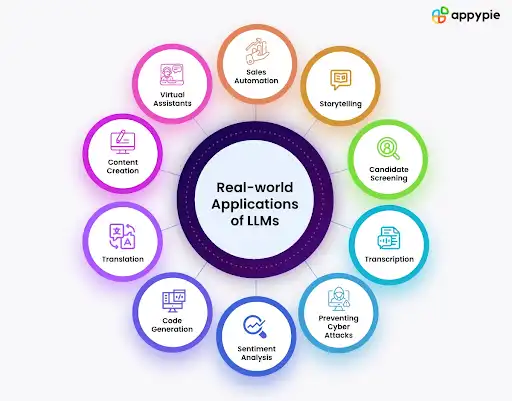
The Challenges of Traditional LLM Development
LLM as a Service is a game-changer especially for LLM for businesses.
LLM as a service skips the need for huge costs, deep expertise, and long wait times traditionally associated with building LLMs.
High Computational Costs
A large language model (LLM) needs massive computer power which can cost a fortune.
It's like asking your home PC to run a space station!
Expertise Required
Building an LLM isn't something you pick up in an afternoon.
It's complex and requires people who are really good at understanding how artificial intelligence and language work. Think of it as needing a top chef to make a gourmet meal.
Data Acquisition & Management
Ever tried organizing a massive library by hand?
Gathering and sorting the data for LLMs is just like that. You need tons and tons of books (or data) arranged just right, which can be pretty overwhelming.
Time-Consuming Process
From start to finish, creating an LLM takes a long time. It's like planting a tree; you wait years to enjoy the shade.
This long development cycle can be a pain when you just want to get going.
How LLM as a Service can Help?
Whether you're after LLM as a service or alternative LLM applications, exploring the offerings in LLaaS can open up multitude of possibilities tailored to specific needs or industry demands.
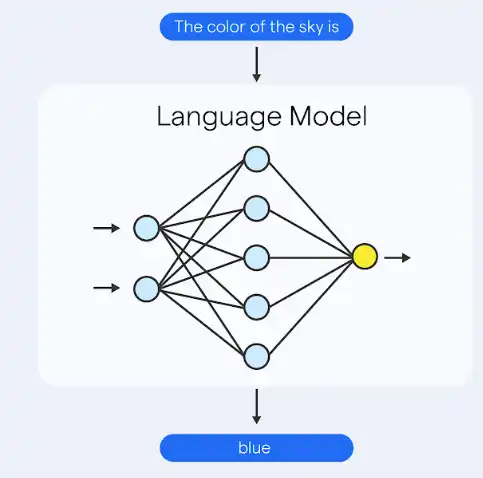
Reduced Development Costs & Faster Time to Market
LLM As a Service speeds things up and cuts down costs.
It's like getting a fast food meal instead of cooking from scratch at home—quick, easy, and way cheaper!
Scalability & Flexibility
With LLM As a Service, you can scale your project up or down based on what you need, just like adjusting your data plan based on how much internet you use.
It adapts easily to your needs whether they're big or small.
Access to Pre-Trained Models & Infrastructure
Instead of building everything yourself, LLM As a Service gives you a head start.
It's like moving into a furnished house. Everything you need, from furniture to a microwave, is already there.
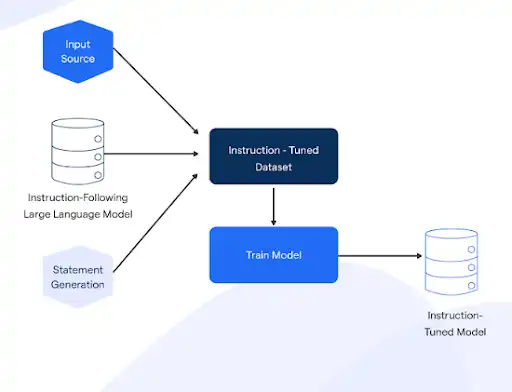
Simplified Customization Options
Let's say you need a tool tailored just for you. LLM As a Service lets you tweak pre-trained models like adjusting seats in a car.
It's straightforward so that the tool fits your specific needs perfectly.
Suggested Reading:
Custom LLM Development: Build LLM for Your Business Use Case
Benefits of Using LLM As a Service
Jumping into LLM As a Service (Let's call it LLaaS for short) can feel like you've just found a secret path in a dense forest. Why?
Because it smoothens out so many wrinkles when dealing with the tricky world of language and tech. Let's break down the benefits:
Enhanced Innovation & Focus on Core Business
Think of using LLM As a Service like having a super-smart assistant.
It lets you do what you do best—run your business—while the service handles the complex language tasks. You get to dream up big ideas and let the service iron out the details.
Improved Efficiency & Resource Allocation
You know how essential it is to use time and money wisely? LLM As a Service is like a magic spell for resource management.
It streamlines your work so your effort and cash go exactly where they should, no waste, no fuss.
Gaining a Competitive Edge
With LLM As a Service, you can turbocharge your product development, zoom past competitors and reach customers quicker. Imagine being the Usain Bolt of your market!
Suggested Reading:
Case Studies of Successful Large Language Model Training
Reduced Risk & Experimentation Opportunities
Diving into uncharted waters can be scary and expensive.
But LLM As a Service offers a safety net, giving you a playground to test new ideas with smaller risk. It's like trying out a new video game in demo mode before buying it.
Getting Started with LLM As a Service
Feeling the itch to get going with LLaaS? Here’s how to scratch it:
Identifying Your LLM Use Case
Before jumping in, you need to figure out what you want from an LLM.
It's like choosing the right tool for a job—say, a hammer for a nail. Define what you need, and you're halfway to success.
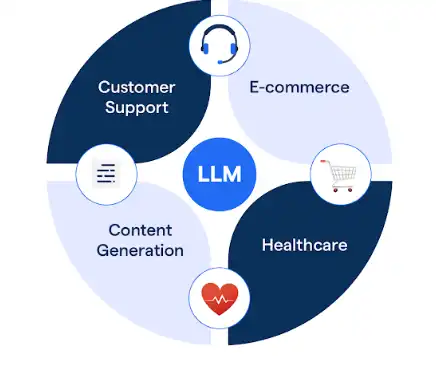
Choosing the Right LLaaS Provider
Not all LLM As a Service providers are created equal. You'll want to pick one like choosing a good pair of shoes—comfortable, reliable, and a perfect fit for you.
Look at their features, support, and how well they play with your needs.
Deployment & Integration with Existing Systems
Now, it's time to get rolling. Fitting LLM As a Service into your current workflow should be as easy as plugging in a USB stick.
The right provider will make the process smooth, ensuring your new LLM works seamlessly with your existing tech.
The Future of LLM as a Service
Thinking about what's next for LLM as a Service is like peeking into a treasure chest of tech goodies.
These language wizards are getting a major upgrade. Imagine chatting with a bot that's not only brainy but gets your witty side, too. It's coming and it'll be quick, whipping through tasks in a blink.
Advancements in LLM Technology
Let's talk about the cool stuff happening with Large Language Model (LLM) as a Service just around the corner.
These smart tools will soon understand us better, pick up on our jokes, and maybe even read between the lines of our emails.
They're getting faster, too, zipping through tasks quicker than we can click refresh.
Evolving Use Cases & Industry Applications
Now, spin your globe and point anywhere; chances are, LLM as a Service will touch down there soon. We're not just talking about answering questions or writing emails.
The future's about LLM for businesses jumping into different play areas, like gaming with words or solving tricky customer service puzzles.
Conclusion
The rapid evolution of Large Language Models has significantly reshaped the landscape of natural language processing.
The stark contrast between LLM vs traditional NLP services underscores the transformative potential of these advanced systems.
As businesses increasingly adopt LLM for their operations, the demand for the best LLM API services continues to rise, driving innovation and competition in the market.
However, the growing prominence of LLMs also necessitates a critical examination of their limitations and societal impacts.
This has spurred research into LLM alternative solutions, focusing on improved transparency, reduced bias, and enhanced privacy.
Alternative LLM applications are emerging in fields such as healthcare, education, and scientific research, demonstrating the versatility of these models beyond conventional use cases.
Looking ahead, the future of LLM for businesses lies not only in refining existing models but also in developing specialized LLM alternative solutions tailored to specific industry needs.
As we navigate this AI-driven era, striking a balance between harnessing the power of LLMs and addressing their ethical challenges will be crucial for sustainable progress in natural language processing.
Suggested Reading:
Custom LLM Models vs Pretrained Models: A Complete Analysis
Frequently Asked Questions (FAQs)
What is LLM as a Service?
LLM as a Service offers access to pre-trained Large Language Models, enabling businesses to integrate advanced language understanding into their applications without extensive AI expertise.
How can LLM as a Service benefit my business?
It accelerates the development of applications requiring natural language processing, reducing both time and cost while ensuring high-quality, AI-powered interactions.
Do I need a team of AI experts to use LLM as a Service?
No, one of its main advantages is making cutting-edge language models accessible to businesses without the need for in-house AI specialists.
Can LLM as a Service be customized for specific industries?
Yes, many services allow customization to align with industry-specific terminology and user intents, enhancing the model's relevance and accuracy.
What kind of applications can I build with LLM as a Service?
From chatbots and virtual assistants to content generation and language analytics tools, the possibilities are vast and varied across numerous industries.

